 Petzlover
Petzlover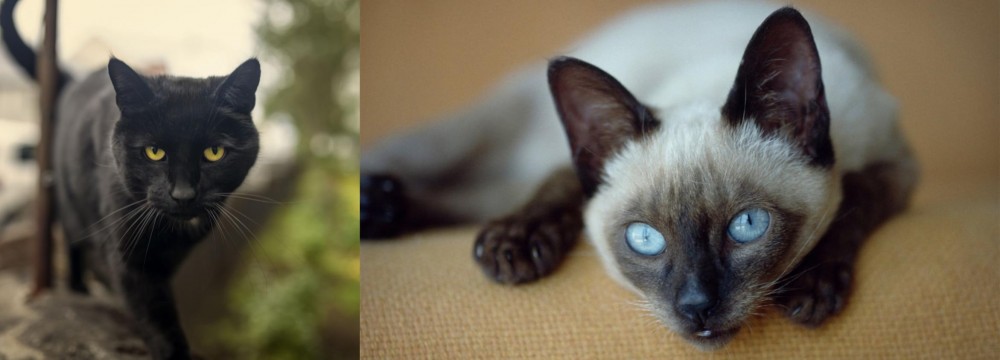 Bombay is originated from United States but Siamese is originated from Thailand. Both Bombay and Siamese are having almost same weight. Both Bombay and Siamese has same life span. Both Bombay and Siamese has same litter size. Both Bombay and Siamese requires Low Maintenance.
Bombay is originated from United States but Siamese is originated from Thailand. Both Bombay and Siamese are having almost same weight. Both Bombay and Siamese has same life span. Both Bombay and Siamese has same litter size. Both Bombay and Siamese requires Low Maintenance.
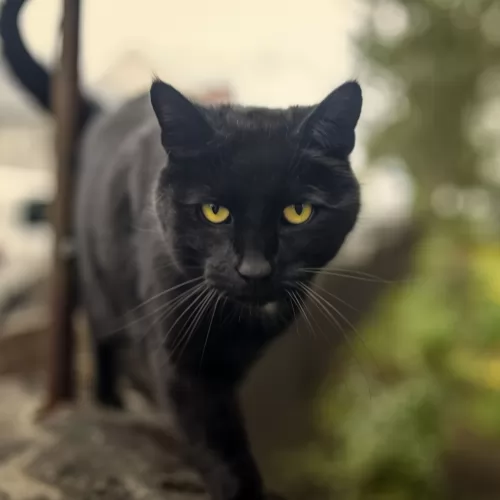 The Bombay cat was developed by breeding black American Shorthair cats and sable Burmese cats to bring about a sleek panther-like cat.
The Bombay cat was developed by breeding black American Shorthair cats and sable Burmese cats to bring about a sleek panther-like cat.
Cats of the Asian group are given the name Bombay cats. It is also known as the Black Mamba or mini-panther. In fact the Bombay cat was developed by Nikki Horner, a breeder from Kentucky, USA.
In 1976 the Bombay cat was successfully bred and was recognized and registered by the Cat Fanciers' Association in 1970 and also the International Cat Association.
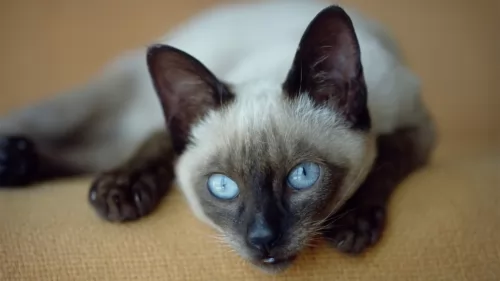 The Siamese cat is one of the most recognized cat breeds there are. The cat hails from Thailand and is the foundation stock for a number of other breeds.
The Siamese cat is one of the most recognized cat breeds there are. The cat hails from Thailand and is the foundation stock for a number of other breeds.
It comes in two distinct variations - traditional and the more modern Siamese.
In the United States, most of the top cat registries only consider the 4 original fur colors as Siamese – chocolate point, seal point, blue point, and lilac point.
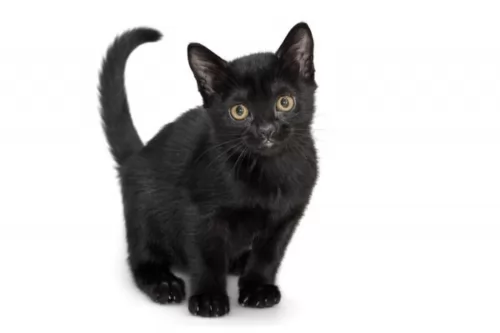 As a short-haired cat, the Bombay is related to the Burmese cat. It’s a medium-sized cat, muscular, lithe, and agile – like a black panther.
As a short-haired cat, the Bombay is related to the Burmese cat. It’s a medium-sized cat, muscular, lithe, and agile – like a black panther.
The cat weighs anything between 3 to 7kg. It is a stocky, compact cat with a round head and ears that are fairly rounded at the tips. The coat of the Bombay is short and glossy. In fact, it is the pitch-black short, close-lying shiny coat of the Bombay cat that makes it so distinctive and that with its green or copper-colored eyes. The cat’s nose as well as the pads of their paws, are also black
Bombay cats are very social, getting on well with all their human family members. They’re affectionate and like to demand attention from their humans.
They’re typical cats in many ways and are curious and alert. You wouldn’t describe the Bombay as an independent cat breed, although the older ones do become more independent as they mature but they are cats that dislike being left alone for long periods of time.
They are however adaptable to different lifestyles and can easily learn new tricks. They’re intelligent cats and will need toys that make him think. He always loves to play with the toys close to his human owner and has quite a loud meow and purr to voice his feelings
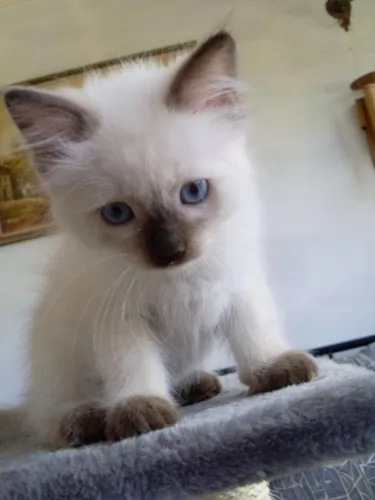 The Siamese cat is a medium-sized cat. Today’s Siamese cat is recognized by the triangular-shaped head, the slender, muscular body, the blue almond-shaped eyes, the largish ears, and the cream point colored coat.
The Siamese cat is a medium-sized cat. Today’s Siamese cat is recognized by the triangular-shaped head, the slender, muscular body, the blue almond-shaped eyes, the largish ears, and the cream point colored coat.
The face of the Siamese also has a mask of the same point color. Weighing at between 3 – 5kg, the Siamese has a long neck and slender tail.
All Siamese kittens are cream or white at birth, but they develop visible points in the first few months of life. The coat is short and glossy. By the time the kitten is 4 weeks old, the points are clearly distinguishable.
Siamese are affectionate, curious, playful, intelligent cats and are known for their vocal, social natures.
With the Siamese cat, you may see him bonding strongly with one particular person in the family.
They’re active cats and are also one of these cat breeds that are described as being more dog-like. Some of them become so attached to their human owners that they can become depressed or suffer from separation anxiety when left alone for long periods of time.
Because of the cat’s intelligence, he can be easily trained to respond to simple commands.
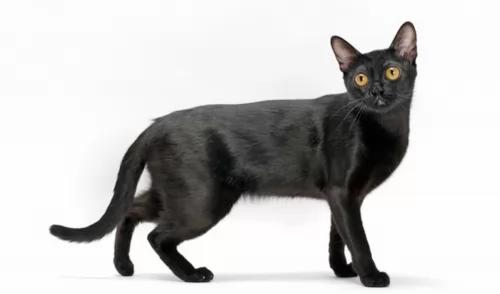 These sleek panther-like cats are a perfect choice if you want a cat that loves its human family.
These sleek panther-like cats are a perfect choice if you want a cat that loves its human family.
Every cat has got their peculiarities and these Bombay cats like heat – you’ll always find them curled up close to the fire or heaters. On a sunny day they’ll want to be outside soaking up the warmth.
Provide your Bombay with all the things he loves and he is guaranteed to make you the most awesome feline companion.
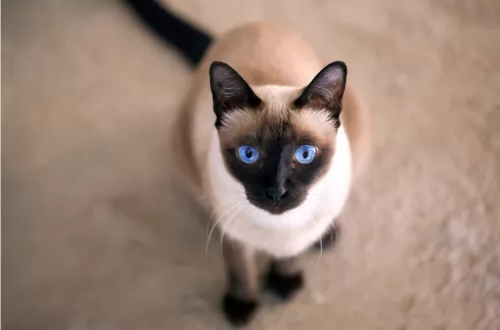 The Siamese cat is such a popular breed and with good reason. It makes a splendid companion for single people, families, couples, and older people. It gets on well with children and other pets too.
The Siamese cat is such a popular breed and with good reason. It makes a splendid companion for single people, families, couples, and older people. It gets on well with children and other pets too.
However, it is an energetic cat and won’t relish lying around day after day. He will want you to play with him and exercise him too, providing him with a stimulating environment.
These are such affectionate cats too, that it will be too sad if he lands up in a home where people don’t provide him with love and care. In exchange for that, you couldn’t ask for a better companion and friend.
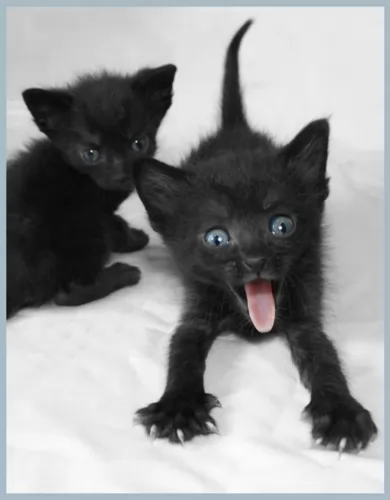 With good care these amazing cats can live to be between 15 and 20 years of age. Your Bombay, just like with other pets, can have any one of the health problems that cats are known for.
With good care these amazing cats can live to be between 15 and 20 years of age. Your Bombay, just like with other pets, can have any one of the health problems that cats are known for.
One of these diseases is craniofacial defect where there is a deformity of the head. Kittens with this deformity are always euthanized.
Vomiting is a sign that all is not well with your cat. Vomiting is actually a common problem with cats and is indicative of a number of causes. It could mean your cat has eaten something inedible, it could mean an infection or even a urinary tract problem.
Remember that ongoing vomiting can lead to dehydration so if your cat continues you must get him to the vet as soon as possible.
Feline Lower Urinary Tract Disease for instance can affect both your male or female cat. There are a number of causes of which stress and being overweight are just two.
You’ll notice your cat battling to urinate, blood in the urine, lack of appetite, restless and licking around the urinary area because of pain. Certainly, this is one reason you want to get your beloved cat to the vet.
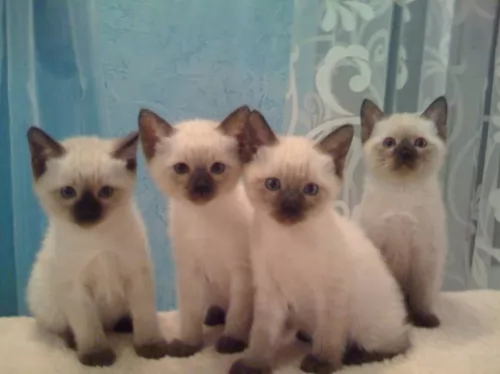 With good care, your Siamese cat can live to be between 12 and 20 years of age. It is a slim cat, so you want to keep him that way as becoming overweight can put a whole lot of pressure on the cat’s joints and bring on other health issues.
With good care, your Siamese cat can live to be between 12 and 20 years of age. It is a slim cat, so you want to keep him that way as becoming overweight can put a whole lot of pressure on the cat’s joints and bring on other health issues.
There are always some common cat diseases to watch out for and one of these is mammary tumors. They also battle with gastrointestinal problems and lung infections.
They are actually prone to respiratory problems, but this is more seen in younger cats. Upper respiratory infection with the Siamese cat will usually last about a week or it can go on longer.
Your cat with have a nasal or eye discharge, will be drooling as well as have ulcers around the nose and mouth with aches and pains aa well as lethargy.
Make sure that your Siamese cat is up to date with his vaccinations.
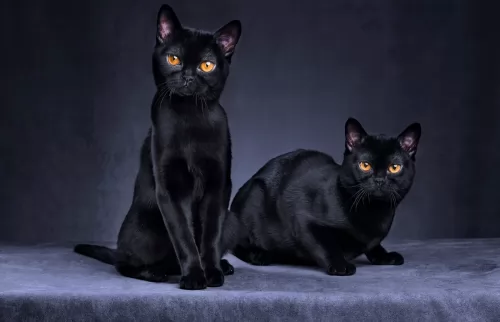 The Bombay isn’t a heavy shedder and requires very little grooming.
The Bombay isn’t a heavy shedder and requires very little grooming.
Provide your Bombay with the right kind of nutrition so that it has every chance to be strong and healthy. Cats are carnivores and you want to be sure that he gets the best food. Make sure that he gets home-made or commercially manufactured cat food that is high in meat protein. Do research or check with your vet to make sure he is being fed the best food there is for his age and activity levels.
Your Bombay requires a constant source of fresh, cool water night and day.
Check inside his mouth from time to time to ensure there are no rotting teeth causing him pain and discomfort. Also, check inside the ears ad make sure they aren’t red which could indicate an infection.
Always get your pet to the vet immediately you suspect that something is wrong.
Keep your cat’s litter box spotlessly clean.
Neuter or spay your Bombay cat to prevent unwanted kittens.Spaying and neuterings as some very beneficial health advantages for your furry friend as well.
 Good diet is one of the most important ways to care for your Siamese cat. Your cat is a carnivore and you therefore need to ensure he gets an appropriate diet otherwise you’re going to be spending more time at the vet with a sick cat than you’d like to.
Good diet is one of the most important ways to care for your Siamese cat. Your cat is a carnivore and you therefore need to ensure he gets an appropriate diet otherwise you’re going to be spending more time at the vet with a sick cat than you’d like to.
Always check with your vet if you have any uncertainties about feeding your Siamese kitten. Kittens will eat different food to an adult, and even in adulthood, there is commercial cat food manufactured for adult cats, pregnant felines, lactating cats, energetic cats, senior cats and sick cats.
Where possible, you will need to try and provide your cat with some fresh, raw meat too.
Never leave your cat without a bowl of fresh, cool water night and day.
The coat of the Siamese cat is thick, soft, and silky and he will require a brush every week to keep it like that.
They are agile, athletic cats, loving to jump up onto perches so it will be a good idea to provide a climbing tree or some other equipment where the cat can leap up onto.
Provide your cat with a litter box and make sure that the cat’s feces are removed every single day.